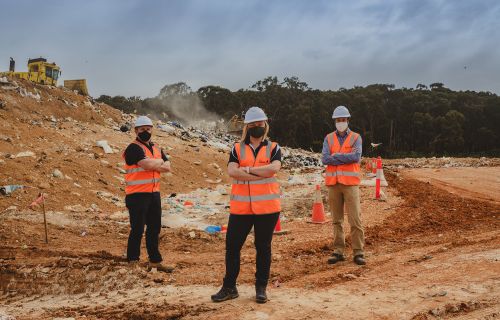Working towards a more sustainable future | ourballarat Summer 2021-22
Managing waste is one of the greatest issues facing governments. The City of Ballarat is tackling the challenge head-on with a plan to develop a Materials Recovery Facility (MRF) that will help keep 10,000 tonnes of valuable recyclables out of Ballarat’s landfill each year. A Materials Recovery Facility will sort our recyclables into separate streams of plastics, cardboard, aluminium and paper, so they can be remanufactured into useful new products.

Every week around 48,000 rubbish bins are collected from Ballarat homes. Throw in the city’s commercial waste and it means around 50,000 tonnes are tipped into Ballarat’s landfill each year. Waste disposal is expensive.
The City of Ballarat’s annual waste budget is around $22 million to cover the cost of rubbish, recyclables and green waste bin collection as well as managing the Transfer Station, Ballarat Regional Landfill and Pass on Glass.
Les Stokes, City of Ballarat’s Executive Manager Waste and Environment, says the cost will continue to grow unless people change their habits.
“Sadly, a lot of what we bury isn’t waste at all, a lot of it is recyclables that could be put to new use,” he says.
“Our whole community needs to work to reduce the amount of waste going to landfill. Consumerism combined with excess packaging and poor recycling habits are a big problem.”
Les says construction of a new cell for waste at the Ballarat Regional Landfill is costing $2.9 million and on current trends it will be full in two years.
“It’s not sustainable, financially or environmentally.”
The City of Ballarat is doing its part by continuing to reassess its operations to make them as waste free as possible. We are also seeking government support to create a Circular Economy Precinct, anchored by a Materials Recovery Facility (MRF), in the Ballarat West Employment Zone. A MRF is one of several projects the City of Ballarat is seeking funding for from the Victorian and Australian Governments.
A circular economy
City of Ballarat Circular Economy Lead Siobhan Dent is overseeing our circular economy work.
“There is already great interest from the recycling sector. When we’re talking to manufacturers and recyclers, they say the most important thing they need is good quality, clean, well-sorted product,” she says.
“We have businesses wanting to invest $270 million+ in a Circular Economy Precinct at the Ballarat West Employment Zone and we expect more investment when the precinct is up and running. Infrastructure like the MRF allows us to attract businesses which want to co-locate so they can use the plastics, paper, metals and cardboard it sorts.
“This project will provide more local jobs and maximise the benefits to our economy. The number of jobs involved in material reprocessing is a lot higher than in dumping waste in landfill.”
Siobhan says Victoria will need more Materials Recovery Facilities to divert more resources from landfill.
“From inception about 32 per cent of the materials sorted at the MRF will be able to be used by recyclers and remanufacturers locally. This project also solves a problem for the State Government as it aligns perfectly with government recycling policy.”
A regional solution
City of Ballarat Materials Recovery Facility Business Case Lead Quenton Gay is managing the business case for the MRF.
“With a processing capacity of around 30,000 tonnes per year, the MRF will have enormous potential to service much of western Victoria. “We’re working with the Grampians Central West Waste Resource Recovery Group and regional councils to determine how best to maximise the regional benefits a MRF will bring.
“It will provide greater confidence in continuity of recycling services for regional councils and reduce transport costs to access Melbourne-based services."
Critically, about 65,000km and $900,000 in transport costs will be saved, plus about 41,500 tonnes of greenhouse gas emissions. These benefits will continue to grow as we work together with our regional councils to maximise access to sorted, clean recyclables for regional manufacturers.
Better recycling makes a difference
- Each year 5,000 truck-loads of Ballarat’s waste are dumped in Ballarat’s landfill – that’s around 50,000 tonnes
- Better recycling habits at home could mean 10,000 less tonnes going to landfill – that’s around 1,000 truck-loads
- Construction of the new cell at the Ballarat Regional Landfill will cost $2.9 million and has a life expectancy of just two years
- All up we’re spending about $28,000 a day to dispose of waste
City of Ballarat Council Plan Alignment
The projects, initiatives, and ideas in this article align with the following goals of the City of Ballarat Council Plan 2021-2025:
Goal 1
An environmentally sustainable future
Goal 5
A strong and innovative economy and city
Goal 6
A Council that provides leadership and advocates for its community